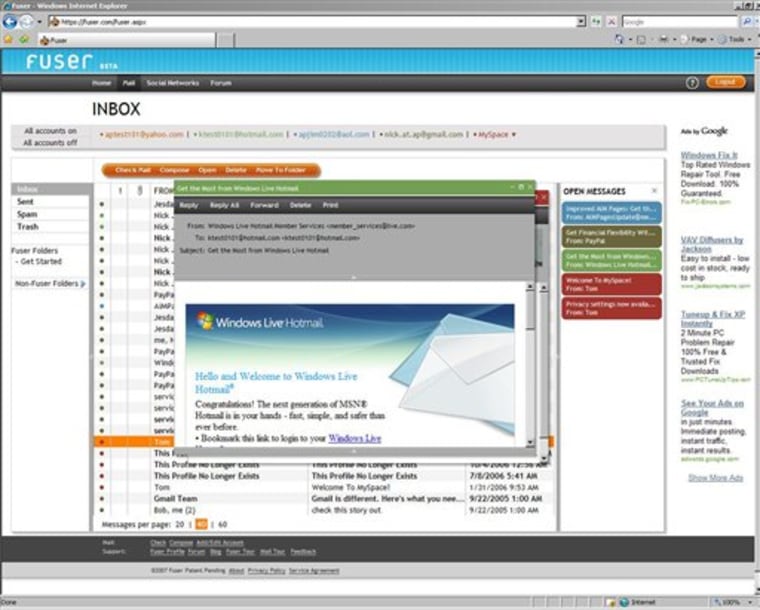It sounded like a dream come true for someone with dozens of e-mail and social-networking accounts: A free Web service called Fuser that lets you check all of your messages from one central location.
Alas, after giving Fuser a whirl, I'll still be checking my accounts separately.
I found Fuser still a bit clunky. Granted it's officially in a "beta" test mode, but I expect a lot these days once services open to the public.
Fuser does show some promise.
I could easily add accounts from the major Web mail services — Google's Gmail, Yahoo, Microsoft's Hotmail and Time Warner's AOL — and check them all through one inbox.
I eventually got my EarthLink and Road Runner accounts to work, after Fuser's tech support helped identify my company's own firewalls as the culprit. Besides the major Web mail services, Fuser supports any e-mail account using POP3 or IMAP mail technology, which is to say most of the rest.
Facebook and MySpace
The Fuser inbox even incorporates messages from the two leading online hangouts, Facebook and MySpace. They include messages sent to you privately as well as comments shared more publicly on your personal profile page.
Sadly, all I got through MySpace were spam messages and ones from the universal friend "Tom" — as in Tom Anderson, the MySpace co-founder who is automatically added to new MySpace accounts. It wouldn't be fair, though, to blame Fuser for my unpopularity.
I do like that each account is color-coded. For instance, an orange dot next to a message means it's from Yahoo; a green dot means Hotmail.
The color scheme carries over to a feature for letting you easily switch among messages when you have several open at once. Each message appears as a color-coded box along the right side — just click to jump to the full e-mail.
I can choose to turn individual accounts temporarily on and off, such that only Gmail and AOL messages show up, simply by clicking on the e-mail address. That's handy if, say, I want to filter out all the junk from an account I use primarily for online shopping.
But the service could be more user-friendly in that regard.
To isolate one account, I'd need to turn all accounts off, then turn the one account on. There ought to be a way to pull messages from just that account instantly.
Annoyances add up
I also had to put up with a number of annoyances, including ads appended to the bottom of outgoing messages. Although that's common with many free Web-based services, Gmail doesn't append ads, and I figure the Google-powered ads that appear while checking mail through Fuser ought to be enough to support the free service.
But what frustrated me most was the performance. E-mails can take several seconds to open and in a few cases two minutes, reminding me of the dial-up days. Granted Gmail and others run into problems from time to time, but that's more the exception rather than the rule.
Furthermore, Fuser didn't work at all on the major browsers available for Mac OS X 10.3.9 — not the latest operating system for Apple's computers but still extremely functional. (It worked on version 10.4 and later, though no word on compatibility with the upcoming Leopard edition.)
You could blame the browser or the version of the Java software that runs over it. You could blame my firewall, or even my computer.
I prefer to blame the developers. With so many types of systems and configurations out there — I tested Fuser on four Windows and two Macintosh machines — a good Web service must be more tolerant and consistent. For starters, its error messages should be less cryptic. To me, a "beta" tag offers little excuse when services are promoted for general use.
Ranking friends
One notable feature to point out is the Leaderboard, which is supposed to rank the friends I communicate with most frequently. It's a good concept, but all it does is underscore how lonely I'd be without messages from "Tom."
A more useful tool would be a ranking of my normal e-mail communications.
Keep in mind also that you'll be trusting all your passwords to an outside service. Fuser says it uses encryption and other safeguards; many e-commerce companies have found their systems compromised despite such pledges. I see nothing to doubt Fuser's intentions, but I've also been wary about adding some of my main personal accounts.
I'm not ready to give up on Fuser entirely. But I plan to wait until it works out the kinks and adds more features. Until then, I'll check my 48-odd e-mail and five social-networking accounts separately.
Just don't expect any quick replies.
